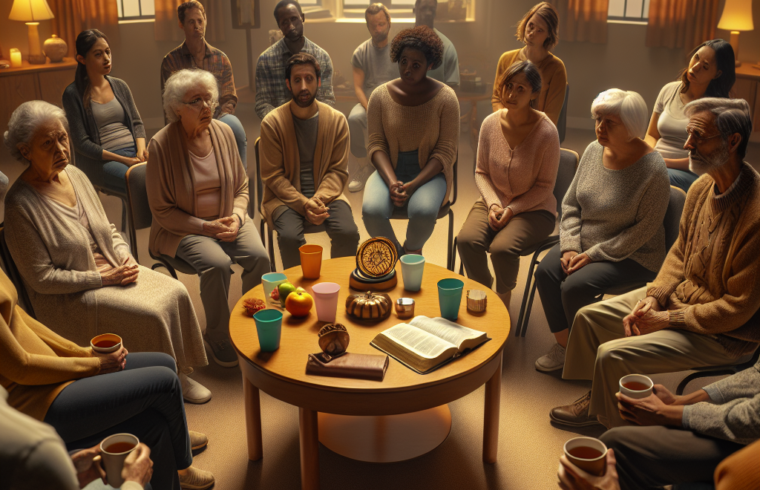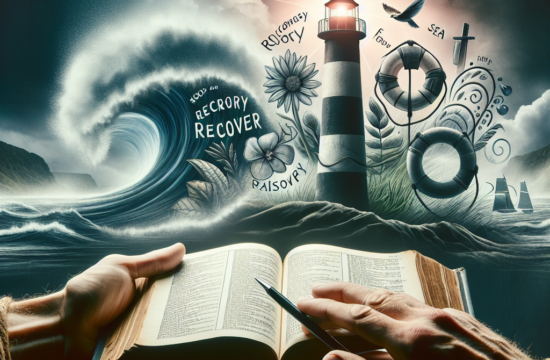==> Thank you for reading this post! Click Here If you are looking for support and Victory over PTSD.
Finding Community Support
Building Trust with Others
When I first joined a Christian trauma recovery group, I had my reservations. The idea of sharing my story with others was intimidating, but I learned quickly how vital trust is in these settings. You want to be around people who get you and who will keep your vulnerabilities sacred.
Trust doesn’t develop overnight. It takes time, openness, and often a few awkward ice-breakers. But as I began to share my struggles and hear the stories of others, it became clearer that I wasn’t alone in my pain.
Justice, as I found, isn’t about what others say; it’s about what you feel. The more we shared, the more I began to feel accepted. It’s amazing how a community centered on Christ can allow us to unravel our stories with safety.
The Role of Shared Experiences
It’s pretty wild how much healing can happen when you listen to the experiences of others. I remember a particular session where someone shared a story that struck such a deep chord within me. Suddenly, I could see my struggles mirrored in theirs, and that sense of solidarity was healing in itself.
When you hear others articulate feelings you’ve held in silence, it galvanized a sense of community. It was like: “Wow! You get it!” Shared experiences unearth underlying truths that may have eluded me before.
Then, I realized that different perspectives could also help me gain insight into my own trauma. This mutual exchange of stories, filled with both heartache and hope, made a palpable difference in my recovery journey.
Encouragement and Accountability
Let’s face it, recovery isn’t linear. There are ups and downs. However, having a group of people who cheer you on is priceless. The regular check-ins and the ‘how are you doing?’ really contribute to holding each other accountable.
I formed friendships that went beyond the group sessions. We texted, prayed, and encouraged each other throughout the week. This accountability isn’t just about staying on track; it fosters genuine concern for one another’s well-being.
Being encouraged and held accountable is invaluable. Support like this helps us all to keep going even when things feel heavy. Knowing there’s a group that cares makes all the difference in facing this journey together.
Understanding Our Trauma
Diving Deep into Personal Stories
The process of unpacking trauma is like peeling away the layers of an onion. The more we shared, the deeper I found myself reflecting on my own experiences. It became clear that understanding trauma isn’t just about facing the pain but also about forming a narrative around it.
You might think you know your story, but relaying it to others brings deeper insights. For me, vocalizing experiences helped to untangle the emotions buried underneath. That real talk can sometimes trigger more tears than expected, but it’s all part of the healing journey.
As others shared their stories, I began to see the threads that tied us all together: pain, loss, and, ultimately, resilience. That sense of connection made navigating my own trauma a little less daunting.
Recognizing Triggers
A key part of understanding trauma is recognizing what can set us off. I had never fully owned the fact that certain situations or phrases could transport me back to dark places. Through open discussions, I began to unpack some of my triggers.
Identifying these triggers isn’t just about avoidance; it’s about understanding my limits. Each session provided me with tools to recognize these situation before they escalate. It was empowering to reclaim my narrative instead of being a prisoner to my past.
Having a supportive community made it easier to discuss these uncomfortable topics. It’s a safe space to say, “This really gets to me,” and receive understanding instead of judgment which feels monumental during recovery.
Finding Healing through Christ
For me, faith plays a powerful role in my recovery. Being part of a Christian trauma recovery group provided a framework for tying my healing back to my beliefs. We shared prayers, scriptures, and reflections that reminded us of Christ’s love and grace.
Embracing my spirituality amidst healing has taught me about grace—both for myself and others. The challenges we’re facing don’t define us; rather, they shape our journeys. I found that inviting Jesus into my suffering provided an unmatched comfort.
Moreover, the discussions often circled back to hope. Hope in God’s plan for us was an anchor amidst the storms of recovery. This connection transcended our traumas and fueled our resilience. That’s the beauty of a faith-based environment—it can inspire healing in unexpected ways.
Get Support and Help with Recovery! Visit us for more Information and Support
The Growing Confidence
Taking Baby Steps
One of the most pivotal lessons I’ve learned is the importance of moving forward at my own pace. Recovery isn’t a race; it’s a journey. Small victories matter, whether it’s speaking up in a group or journaling my thoughts.
Each step taken—no matter how small—works to rebuild confidence. I remember feeling elated after sharing my thoughts even when nervous. Those moments remind us that we are making progress, and they deserve to be celebrated.
Gradually, I began voicing thoughts that had been hidden for so long. Those tiny steps can sometimes make the biggest differences in our paths towards healing. I learned that I don’t have to climb the entire mountain at once; just a few crucial steps are enough to start.
Breaking Out of Comfort Zones
As I gained confidence, I found myself pushed out of my comfort zones in fruitful ways. Leading prayer or sharing a reflection felt terrifying at first, but that gentle nudging from the group made it all easier.
Though it felt like stretching my limits, I began to see how powerful it was to share not only my pain but also my triumphs in faith. Growth often comes from those uncomfortable situations, and I learned to embrace them, even when it felt scary.
Being challenged in this way promotes resilience and self-discovery. By confronting these fears collectively, we create a bond that encourages everyone to open up more, cultivating a blossoming community of courage.
Cherishing Friendships Built on Transparency
Through this entire experience, I’ve met some incredible people. The friendships created over shared vulnerabilities are something I cherish deeply. From late-night talks to prayer sessions, it’s a bond forged through authenticity.
These friendships are unique; they come from a place of understanding and compassion rather than judgment. I found that being open about my weaknesses attracted people who are also committed to their journeys of healing.
The beauty of these connections lies in their supportiveness. Knowing that I have a friend to lean on makes me feel a little braver, encouraging me to face my challenges head-on with someone by my side. Together, we walk this road of recovery—never alone.
Conclusion: Moving Forward Together
Engaging in Christian trauma recovery groups has been truly transformative. The community, faith, and shared healing process have provided me with newfound strength and understanding. Each journey is unique, but the principles of love, support, and Christ-centered growth have a universal resonance.
I encourage anyone considering joining such a group to take that first step. It might feel daunting at first, but the impact can be profound. The shared experiences, understanding, and encouragement can light the path ahead.
As we walk together, we gain clarity, resilience, and above all, a reminder that healing is possible. So, if you’re ready to take the leap, know you’re not alone—we’re all in this together!
FAQ
What are Christian trauma recovery groups?
Christian trauma recovery groups are support communities where individuals explore their trauma through a faith-based lens, providing an environment of healing grounded in mutual sharing and God’s love.
Why is community support important during trauma recovery?
Community support is essential because it offers understanding, encouragement, and accountability. It provides a space where individuals can share experiences and feel less alone in their struggles.
How does faith play a role in the healing process?
Faith can provide comfort, hope, and a sense of purpose during recovery. It reminds individuals that they are valued and not defined by their trauma, fostering resilience and healing.
What should I expect from a recovery group?
You can expect a welcoming space where you’ll share experiences, listen to others, pray, and gain insights into your journey. It’s a respectful environment where vulnerability is encouraged.
How can I join a Christian trauma recovery group?
To join, look for local churches or community centers offering support groups. Many churches promote these groups through their member services or online platforms. Don’t hesitate to reach out and express your interest!











